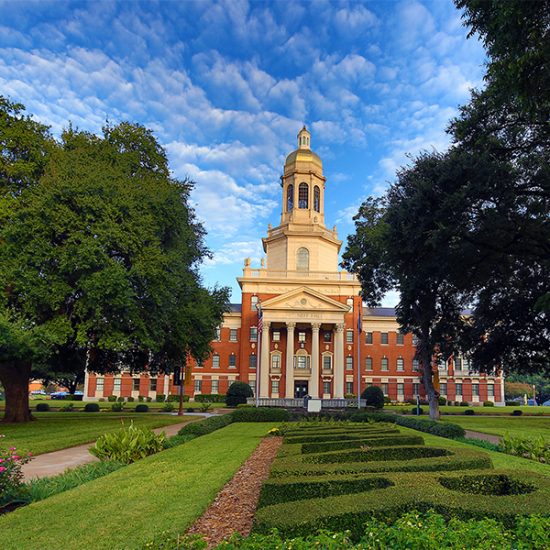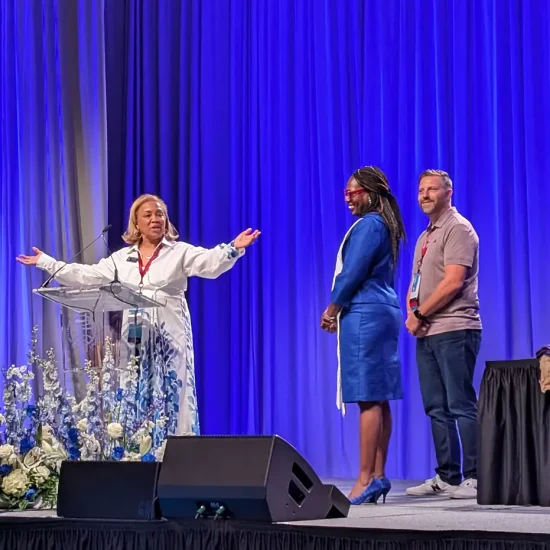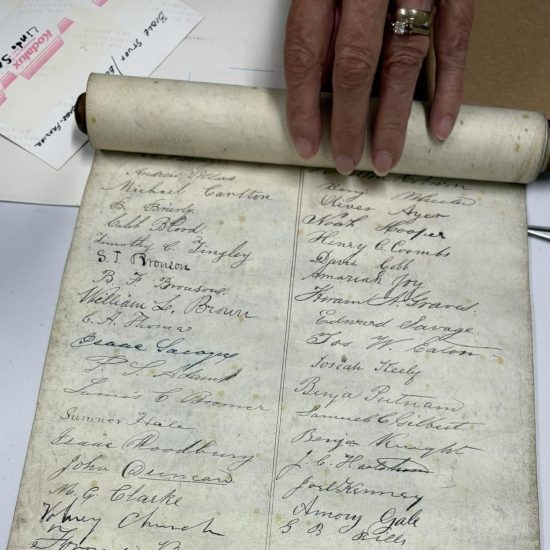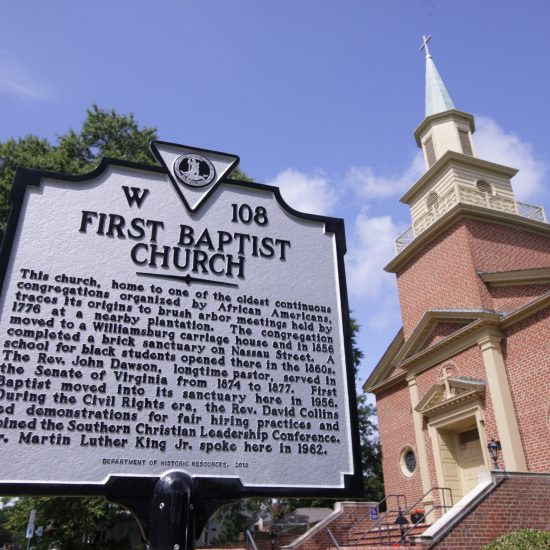Baptists from across the U.S. gathered in Atlanta last week at the New Baptist Covenant’s (NBC) 2018 summit, committing to continue the “journey to justice” for all people.
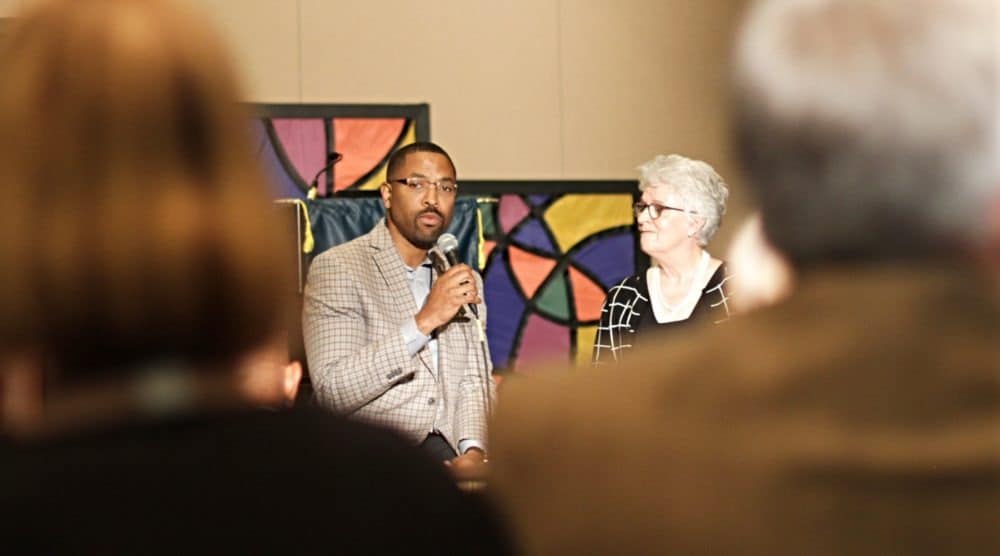 Corey Walker and Linda McKinnish Bridges share about their “covenant of action” at the New Baptist Covenant 2018 summit. (Photo: EthicsDaily.com)“The New Baptist Covenant celebrated their 10-year anniversary by shining a light on their covenant partnerships and recommitting to the long journey of racial justice,” said Mitch Randall, executive director of EthicsDaily.com. “Baptists from across the U.S. gathered to listen, learn and seek strategies to combat systemic racism and offer opportunities to carve a new path toward equality.”
Corey Walker and Linda McKinnish Bridges share about their “covenant of action” at the New Baptist Covenant 2018 summit. (Photo: EthicsDaily.com)“The New Baptist Covenant celebrated their 10-year anniversary by shining a light on their covenant partnerships and recommitting to the long journey of racial justice,” said Mitch Randall, executive director of EthicsDaily.com. “Baptists from across the U.S. gathered to listen, learn and seek strategies to combat systemic racism and offer opportunities to carve a new path toward equality.”
Hannah McMahan, executive director of NBC, welcomed around 60 Baptists to the summit on Monday afternoon, offering a brief reflection on 10 years of following God through unknown, uncertain paths and inviting summit participants “to see what the spirit [of God] will do.”
Three worship gatherings reminded participants of the biblical call to seek justice for all and offered testimony about the ways Baptists are working to fulfill this imperative.
Marvin McMickle, president of Colgate Rochester Crozier Divinity School, delivered the opening sermon during worship on Monday, calling participants to recognize the difference between “justice” and “just-us.”
Too often, human groups seek elements of “justice” – healthcare, housing, quality education, fair wages, voting rights – not for all, but “just for us,” he explained.
“The struggle for all of us, the struggle for the church, the struggle for the nation … is the struggle over how to pronounce these two words,” McMickle said. “Justice is a wonderful thing, but for whom? For all of God’s children? For Americans and all the rest? For men and all the rest? For whites and all the rest? For whom?”
A daily time for small group reflection offered attendees the opportunity to discuss topics and issues raised in larger group settings, while breakout sessions provided an opportunity to hear from experts engaged in issues of social justice.
Session topics included engaging the electoral process, adding advocacy and justice missions to a congregation’s ministries, recognizing and addressing white privilege, and establishing a “covenant of action.”
NBC’s covenants of action encourage collaboration among Baptist churches of different racial and ethnic backgrounds to engage in dialogue and joint initiatives in their communities.
Testimony from two sets of covenant of action partners was featured during plenary sessions on Tuesday and Wednesday mornings.
Linda McKinnish Bridges, president of Baptist Theological Seminary of Richmond, Virginia, and Corey Walker, dean and professor of religion and society at Samuel DeWitt Proctor School of Theology at Virginia Union University in Richmond, spoke about the covenant established to foster collaboration between their academic institutions.
Scott Dickison of First Baptist Church of Christ and James Goolsby of First Baptist Church, both pastors from Macon, Georgia, shared about collaborating together as they work to fully understand, acknowledge and heal from a painful shared history of enslavement and racism.
At Tuesday’s worship gathering, Jessica Felix Romero, communications director at Sojourners, spoke about the connection between land use, creation care, peacebuilding and racial justice.
“Understanding the land and biblical justice guidance that God gives us to use the land to prevent injustice must become a part of all our racial justice work,” she said. “What are we doing to ourselves and to the heart God has for the oppressed when we continue to exploit the earth and its people in order to feed ourselves?”
Interviews with activists Ruby Sales and Tim Wise further explored how local churches and people of faith can pursue racial justice in their communities.
“It’s a sociological statement that to be white in a system of white supremacy means that certain advantages will be conferred upon you with or without your consent,” said Wise.
“I submit to you today that the story has not been told – that the South has a rendezvous with destiny, that the whole struggle for human and civil rights will be fought in the South,” said Sales. “It will be the battleground for human and civil rights in the 21st century.”
The final worship gathering on Wednesday afternoon featured a joint sermon preached by Darryl Roberts, pastor of Nineteenth St. Baptist Church, Washington, D.C., and Julie Pennington-Russell, pastor of First Baptist Church of the City of Washington, D.C.
Drawing on Jesus’ encounter with the Samaritan woman at the well in John 4:4-30, Roberts and Pennington-Russell spoke about overcoming the blindness of prejudice and racism as essential in the work and ministry of reconciliation.
“Of all the conditions mentioned and named in the New Testament, none appears more frequently than the affliction of blindness,” Pennington-Russell said. “At our worst, our blindness prevents us from seeing some people as human, and at our utter worst, we go so far as to defend our blindness in the very name of God.”
Roberts observed, “At the moment that we realize this work [of seeking racial justice and reconciliation] is bigger than us … God can begin to use us as agents of change to help people begin to see what is possible in the world when we yield ourselves to God.”
Photos from the NBC 2018 summit are available here.
This article originally appeared on EthicsDaily.com.

